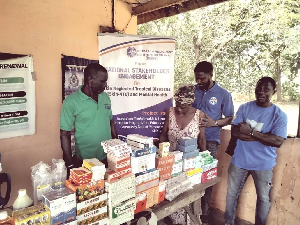Healthcare delivery in the Keri CHPS Zone of the Nkwanta South District has received a significant boost with the donation of medical and surgical supplies valued at GH¢10,000.
The initiative aims to enhance care for individuals with skin-related Neglected Tropical Diseases (skin-NTDs) through the work of Peer Support Groups.
The supplies, procured after a thorough needs assessment, include surgical tools for wound care and medications for pain management and infection control. These contributions are expected to directly benefit members of six Peer Support Groups formed to combat the physical and psychological challenges associated with skin-NTDs.
The Peer Support Groups are an integral part of a broader program that integrates mental health services and stigma reduction into primary healthcare. The initiative not only supports the physical well-being of individuals with skin-NTDs but also addresses the stigma, discrimination, and social exclusion often faced by these individuals.
Facility Manager Forcemith Boakye-Djan emphasized the critical role of such efforts in reducing the mental health burden associated with skin-NTDs. "These conditions not only affect the body but have severe psychological implications. This support is a lifeline for many," he said.
The donation to the Keri CHPS Zone is part of a larger effort, with similar supplies provided to Ashiabre and Agoufie CHPS zones in the Nkwanta South District and Obunja, Sibi Central, and Sibi Hilltop CHPS zones in the Nkwanta North District. Healthcare workers in these facilities echoed the sentiment, underscoring the importance of the gesture in improving patient outcomes.
The Peer Support Groups, established with support from the Research and Grant Institute of Ghana (ReGIG) and funding from the Anesvad Foundation, have become a pillar for individuals managing the dual challenges of skin-NTDs and mental health concerns. Group leaders expressed their gratitude, noting the tangible impact of the intervention.
Healthcare workers and facility managers pledged to ensure the effective use of the supplies to maximize benefits for the community. With a focus on integration and sustainability, the initiative is set to leave a lasting legacy in addressing neglected health challenges in the Oti region.
Click to view details



Health News of Thursday, 21 November 2024
Source: John Kwesi Agbadza, Contributor

















